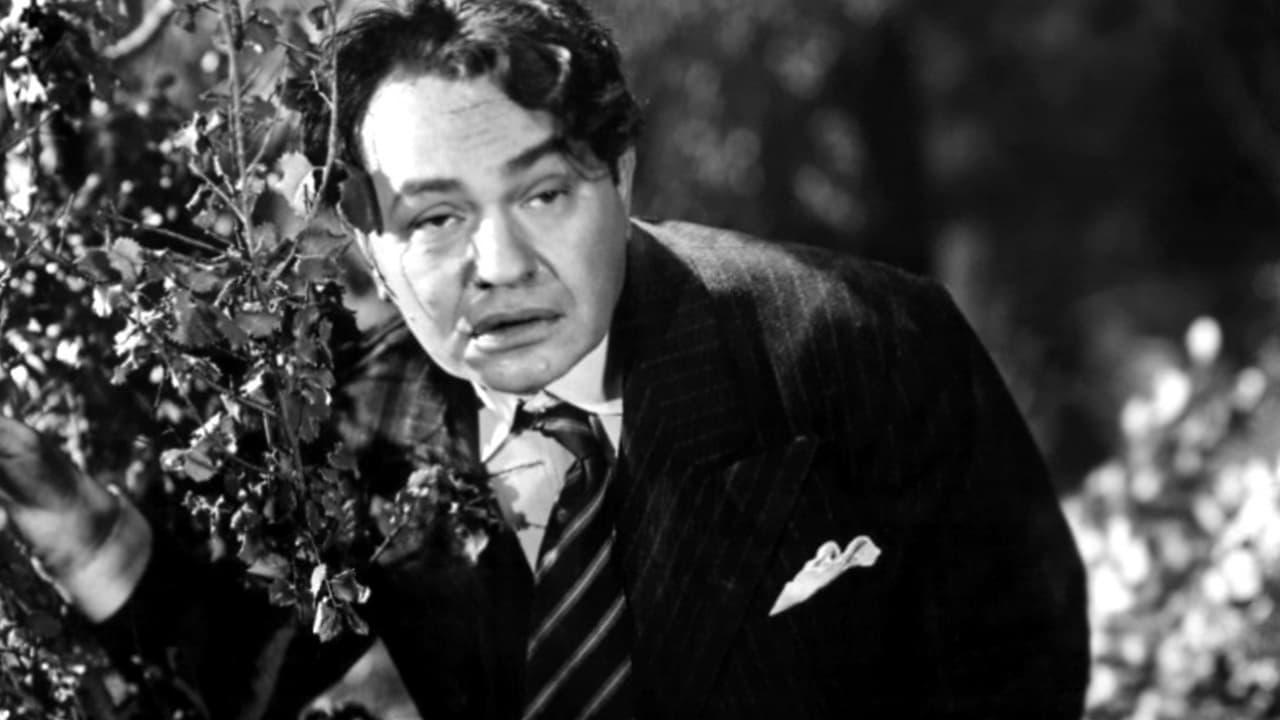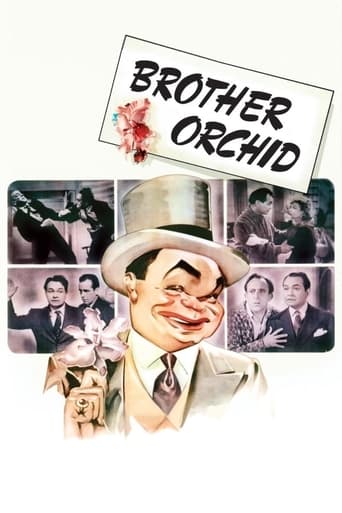

Very very predictable, including the post credit scene !!!
... View Morehyped garbage
... View MoreThe story, direction, characters, and writing/dialogue is akin to taking a tranquilizer shot to the neck, but everything else was so well done.
... View MoreThe best films of this genre always show a path and provide a takeaway for being a better person.
... View MoreBrother Orchid (1940) *** (out of 4) Gangster Little John Sarto (Edward G. Robinson) decides to take a break from his gang so he travels across the country for a trip. When he returns he expects to jump right back in but the new guy (Humphrey Bogart) throws him out on his face. Sarto ends up at a monastery where he begins a new outlook on life. This Warner film contains both laughs and gangster drama and the terrific cast makes it a must see for film buffs. Not only do we have Robinson and Bogart playing gangsters but we have Ann Sothern as Robinson's love interest, Ralph Bellamy playing a rival, redneck, Allen Jenkins as comic relief and Donald Crisp as the head of the monastery. D.W. Griffith fans will also find Wilfred Lucas in a small role as one of the brothers. The performances by all makes this a must see with Robinson leading the way in his typical tough guy role. He has no problem playing the big shot and neither does Bogart when he gets the shine. Seeing the two men acting together is always great fun even if we know what's going to happen in the end. I was also very impressed with Crisp and his calm performance. Bellamy clearly steals the film each time he's in a scene as that dumb, lovable redneck character he plays is so dead-on believable that you can't help but smile. The comic moments really aren't as funny as one would hope but that doesn't hurt the film too bad as the film is very fast-paced and full of nice drama. Again, the main reason to see this is for Robinson and Bogart so fans will certainly eat this up.
... View MoreEdward G. Robinson becomes "Brother Orchid" in this 1940 film directed by Lloyd Bacon and also starring Humphrey Bogart, Ann Sothern, Ralph Bellamy, and Allen Jenkins. Robinson plays a mobster, Johnny Sarto, who works protection. He quits the business, turning it over to his right hand man, Jack Buck (Bogart) and spends five years touring the world in search of class. He comes back home broke from bad investments (the Borgia's bed was made in Grand Rapids) and wants back in.Jack Buck, however, doesn't want to give up his position. When Johnny's airhead girlfriend Flo (Sothern) speaks with Jack about reconciling with Johnny, she reminds him that Johnny witnessed Jack murder someone. Jack pretends to go along with the reconciliation, but in reality, he plans on killing Johnny. Johnny escapes the hit men and, believing Flo set him up, realizes he has no one to turn to. He passes out in front of a monastery and winds up donning the monastic robe and raising flowers.Very funny and warm film with wonderful performances. Robinson always played comedy very seriously, making his sinister gangster seem even funnier here. Beautiful Ann Sothern is great as the ditsy girlfriend who loves Johnny but can't get a commitment out of him. Bogart is still portraying crooks at this point, and he does an excellent job as the dangerous Johnny Buck. Donald Woods and Cecil Kellaway are two of the monks Johnny encounters.Director Bacon did a lot of gangster films at Warners, and he really knew how to pace them.Very enjoyable.
... View More"Brother Orchid" (1940) is a great little movie directed by Lloyd Bacon. It's a favorite Edward G. Robinson film of mine.Gangster Little John Sarto leaves the "business" to head for Europe and gain culture. He comes back broke and still uncultured. He wants his "girfriend" and his "business" back. Well, Flo, the girlfriend, wants a wedding. Jack Buck and the fellas who took over the "business" don't want to give it back...or even share! So Johnny gets together with Willie the Knife (his only friend from the old gang). Willie knows who else is loyal and Little John starts over. Pretty soon he giving the old gang a real run for their money. It's needless to say that Buck and the boys are feeling bad about this turn of events.Flo goes to talk to Buck hoping to get him and Sarto talking. She, and her Montana cowboy, are used to pull Johnny into a trap. Johnny and Buck are to meet alone "Fat Dutches" for drinks and a meeting. Key word is "alone".Flo delivers Johnny not knowing Buck and his buddies have plans for Johnny. In a matter of minutes John has been escorted to a car and is driven away to a quiet, out of the way spot. This does not sound good. John knows he must escape. This won't be easy. He's found badly injured outside a monastery where the monks, some who have lived worldly lives, have retired to God and quiet solitude as they grow flower garden's.John is well taken care of and decides to stay (for awhile, at least). But it's to use these innocents as a great hiding place...and take advantage of anyone and everyone. Well, maybe these people will rub off on him? Yeah, right...Meanwhile, Flo is marrying that Montana rancher. Johnny sees the paper account while the monks are wrapping flowers for market. He asks to ride into town. Brother Superior OK's it.When they arrive in town, Johnny takes off. He talks to Flo who calls off her wedding. When he sees the good Brother again, Johnny notes the gentle man seems a down. Then he sees the flowers still in the truck. "Why?" he asks. The answer is the protection agency. Johnny knows it by the name of "Jack Buck".At this point you may wonder what will happen next. I mean you know Sarto isn't going to allow his friends to be hurt. But, will Sarto supposedly dead, who's going to help get things straightened out? Hmmmmmmm...why not check out the whole story?This is a great cast for this little Crime/Comedy/Drama Film. Edward G. Robinson as Little John T. 'Johnny' Sarto; Ann Sothern as Flo Addams; Humphrey Bogart as Jack Buck; Donald Crisp as Brother Superior; Ralph Bellamy as Clarence P. Fletcher; Allen Jenkins as Willie 'The Knife' Corson; Charles D. Brown as Brother Wren and Cecil Kellaway as Brother Goodwin.
... View MoreI do wish when individuals watch a movie that they get the person who says the lines correct. It is not Donald Crisp that makes the comments about the watermelon to Edward G. Robinson. Donald Crisp as Brother Superior is walking the young boy out of the room after giving him $2.00 for shoes. The other two monks make the comments to Robinson about not liking watermelon and then Robinson says "I get it." Now that that is out of the way, this is an excellent movie with a cast of characters that will later go on to become major stars i.e.-Humphrey Bogar and Ralph Bellamy. There are also plenty of strong character actors in this wonderful movie such as Allen Jenkins and Cecil Kellaway.
... View More